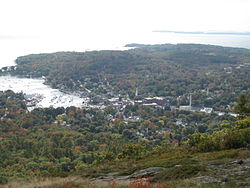Camden, Maine
| Camden, Maine | |
|---|---|
| Town | |

Camden from the summit of Mount Battie
|
|
 Location in Knox County and the state of Maine. |
|
| Coordinates: 44°13′5″N 69°4′55″W / 44.21806°N 69.08194°W | |
| Country |
|
| State |
|
| County | Knox |
| Incorporated | 1791 |
| Area | |
| • Total | 26.65 sq mi (69.02 km2) |
| • Land | 18.24 sq mi (47.24 km2) |
| • Water | 8.41 sq mi (21.78 km2) |
| Elevation | 207 ft (63 m) |
| Population (2010) | |
| • Total | 4,850 |
| • Estimate (2012) | 4,847 |
| • Density | 265.9/sq mi (102.7/km2) |
| Time zone | Eastern (EST) (UTC-5) |
| • Summer (DST) | EDT (UTC-4) |
| ZIP codes | 04843, 04847 |
| Area code(s) | 207 Exchanges: 230,236 |
| FIPS code | 23-09725 |
| GNIS feature ID | 0582384 |
| Website | [1] |
Camden is a town in Knox County, Maine, United States. The population was 4,850 at the 2010 census. The population of the town more than triples during the summer months, due to tourists and summer residents. Camden is a famous summer colony in the Mid-Coast region of Maine. Similar to Bar Harbor, Nantucket and North Haven, Camden is well known for its summer community of wealthy Northeasterners, mostly from Boston, New York and Philadelphia.
Penobscot Abenaki Indians called the area Megunticook, meaning "great swells of the sea", a reference to the silhouette of the Camden Hills (more visibly seen on a bright night). Part of the Waldo Patent, it remained wilderness until after the French and Indian War. It was first settled about 1771–1772 by James Richards, who built a home at the mouth of the Megunticook River. Others soon followed, some making modest attempts to farm the broken and often mountainous terrain. The first home in the area was the Conway House, a Cape Cod style home built in 1770. In 1962, it was purchased and renovated into a history museum.
When Castine was held by the British in 1779, Camden became a rendezvous point and encampment for the Americans, who were commanded by Major George Ulmer. During a raid, the British burned a sawmill. On February 17, 1791, the Massachusetts General Court incorporated Megunticook Plantation as Camden, named after Charles Pratt, 1st Earl Camden, a member of the British Parliament and proponent of civil liberties. During the War of 1812, a battery was built atop Mount Battie near the village. It had both a 12- and 18-pounder gun, but no gunner qualified to operate them. Nevertheless, the fort's appearance of readiness kept the British at bay.
...
Wikipedia
